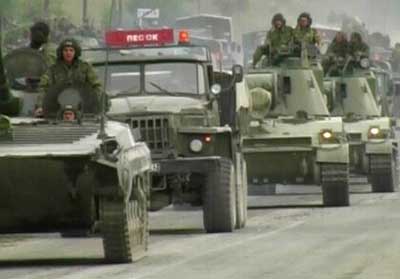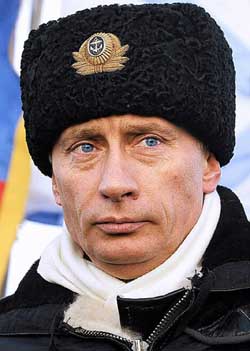 |
International Affairs
Russian Tanks Roll in Soviet-Style Agression
Toby Westerman
The agony of Georgia is an announcement to the world that a new champion of human oppression now strides across the globe. The Russian attack on the nation of Georgia is a warning directed at the West and is partial revenge for humiliation suffered by Moscow in Kosovo, Iraq, and in Georgia itself. It is an act of revenge that should be seen as a wake-up call from Moscow to the West.

Russian troops invade and occupy Georgia |
The invasion carries the message from the Moscow political elite that Russia is again powerful and will do whatever it deems necessary to advance its interests. Russia is rebuilding its military, with improved missiles and aircraft, and is even planning five aircraft carrier groups -- an accomplishment beyond the capabilities of the defunct Soviet Union. The battle flag of today's Russian Federation is the red flag of the Soviet era, and Russian servicemen, especially officers, look as they did under communist rule.
Some of the names may be unfamiliar to many in the U.S., but what is at stake in the Georgian conflict is fundamental to the survival of the United States. Moscow's actions have been those of a totalitarian bully, reminiscent of a never-renounced Soviet past. The invasion was accompanied by a clumsy, Soviet-style media campaign, charging Georgian aggression against Russia, and citing purported Georgian atrocities.
Georgia is Moscow's target today. Humanity wonders who will be targeted tomorrow. Moscow aids anti-U.S./anti-Western regimes around the world with arms and technical advice. The Chavez dictatorship in Venezuela alone has purchased billions in military hardware, including submarines capable of carrying nuclear missiles.
Moscow's message to the United States, the West, and the world must be clearly understood as a challenge to the post-Cold War international order. The U.S. and the E.U. now have an opponent. This turn of events comes at a time when the U.S. is immersed in the war on terror, and Western Europe has grown dangerously dependent on oil and gas from Russia and its allied states.
After the collapse of the Soviet Union, the Moscow elite suffered a series of stinging defeats at the hands of the West, putting into question Russia's role as an important international player. In the Balkans, Moscow watched helplessly as its ally, Serbia, was battered into submission during the 1999 NATO air war against Serbia. Moscow could not aid its old communist ally, Slobodan Milosevic, who fell from Serbian dictator to imprioned war crimes defendant.
Moscow was equally helpless to prevent the Serbian province of Kosovo from declaring its independence. U.S. and E.U. diplomatic recognition of Kosovo was additionally irritating to Moscow.
The United States not only recognized Kosovo's independence, but also maintains a significant military presence in the new nation with a large military base, Camp Bondsteel.

Behind the scenes the all-powerful Putin continues to pull the strings |
Iraq was once a close ally of Moscow, and its one-time leader, Saddam Hussein, was a personal friend of the powerful Soviet and post-Soviet figure, Yevgeny Primakov. The defeat of Hussein by U.S.-led coalition forces and the rebulding of Iraq as a pro-Western nation issued a direct and unanswered challenge to Moscow.
In Georgia itself, Moscow received yet another blow. Georgia had been part of the old Tsarist empire and a republic in the Soviet era. Moscow considers Georgia as part of the "near abroad," nations under Moscow's sphere of influence.
The "Rose Revolution" of 2003, inspired by Western ideals of democracy and popular self-rule, ousted the reliably pro-Russian Georgian president, Eduard Shevardnadze - once a protégé of the last Soviet leader, Mikhail Gorbachev.
The new democratic government of Mikheil Saakashvili began to bring under central government control several rebel provinces, all of which were supported by Moscow. Shortly after taking office, the new Georgian government brought the rebel province of Adjara under control, sending its pro-Russian dictator, Aslan Abashidze, into exile in Russia, the same destination favored by Shevardnadze.
Moscow struck at Georgia because it was determined to show the world that it would no longer lose political partners. Officially the Kremlin justified its right to intervene on supposed Georgian military actions against the pro-Russian province of South Ossetia and claimed that there were requests for aid by Russian citizens living in South Ossetia. (Moscow had decreed Russian citizenship several years ago to many inhabitants of the break-away province). A third pro-Russian rebel province, Abkhazia, joined in the struggle, assisting Russian forces and allying with the rebel fighters in South Ossetia.
In the years following the collapse of the Soviet Union, Moscow's foreign policy has grown increasingly anti-American. Moscow consistently supports dictators around the globe, from the Communist Party in China to the Syrian regime, Iran and North Korea and the neo-Marxist Hugo Chavez in Venezuela.
At home, the Moscow political elite quietly supports the image-rebuilding of the old Soviet Union, including its worst despot, Josef Stalin. The media in Russia are dominated by the government, and its opponents, especially in the press, have been routinely assassinated.
The invasion of Georgia is only the latest move by an increasingly red Russia.

Posted August 18, 2008
Toby Westerman publishes
International News Analysis - Today
An investigative, analytical, and uncompromising weekly analysis of the world situation
Contact T. Westerman at
www.inatoday.com
or P.O. BOX 5182, Rockford, ILL, 61125-0182

Related Topics of Interest
 Moscow: Past is Present Moscow: Past is Present
 Russia to Nuke Neighbors? Russia to Nuke Neighbors?
 Conversion of Russia Negated by Vatican Conversion of Russia Negated by Vatican
 Moscow Warns of a “Looming War of Civilizations” Moscow Warns of a “Looming War of Civilizations”
 The Closest Thing Possible to Stalinism The Closest Thing Possible to Stalinism

 
|
International Affairs | Hot Topics | Home | Books | CDs | Search | Contact Us | Donate

© 2002- Tradition in Action, Inc. All Rights
Reserved
|
 |
|